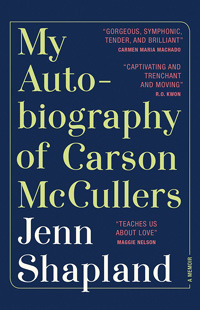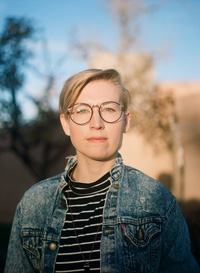- Categories:
An Indies Introduce Q&A With Author Jenn Shapland [4]

Jenn Shapland is the author of My Autobiography of Carson McCullers [5] (Tin House Books), a Winter Spring 2020 Indies Introduce [6] adult debut and a February 2020 Indie Next List [7] pick.
“Shapland’s book intertwines her experience of archiving Carson McCullers’ personal effects with a fresh understanding of McCullers’ life as a lesbian through the deep examination of therapy transcripts, love letters, and a residency in McCullers’ childhood home filled with her everyday household objects,” said Mimi Hannan of La Playa Books [8] in San Diego, California, who served on the bookseller panel that selected Shapland’s debut for the Indies Introduce program.
Hannan continued, “Shapland’s work closes the gap between researcher and subject and lays bare the bias inherent in any biography. The book’s vignettes alternate between McCullers’ life and Shapland’s, creating the sensation of peeking in the window at moments in both women’s lives and coming away with a deeper knowledge of McCullers through her effect on Shapland.”
Shapland’s nonfiction has been published in O, the Oprah Magazine; Tin House; Outside online; The Lifted Brow; Electric Literature; and elsewhere. Her essay “Finders, Keepers” won a 2017 Pushcart Prize, and she was awarded the 2019 Rabkin Foundation Award for art journalism for “Thirteen Ways of Moving to the Desert” and “Field Report: El Paso + Juárez.” She has a PhD in English from the University of Texas at Austin and lives in New Mexico.
Here, Hannan asks Shapland about her debut.

Mimi Hannan: I’m neither queer nor have I read any Carson McCullers, but I absolutely loved this book. Bringing your story into the biography, you made history feel personal. What books provided inspiration to you for the structure or genre of your book?
Jenn Shapland: Biographies make me crazy, because they hold so many amazing true stories, but they can be so daunting. They’re almost always strictly chronological, and as a nonfiction writer, chronological order rarely feels real or alive to me. But I’m invested in the power of life writing, and I knew I wanted to write about Carson’s life. I just had to do it my own way. A bunch of writers working in hybrid genres and short-form sections provided a way to think about structuring the book. Maggie Nelson’s The Red Parts combines memoir and true crime, but also offers a biography of Nelson’s Aunt Jane Mixer in the process of reckoning with her death. In both Citizen and Don’t Let Me Be Lonely, Claudia Rankine allows small encounters and interactions in her daily life to fuel a larger argument about marginalization and discrimination of black women, and I definitely drew from her work, using similar material to make a case for lesbian invisibility. I’ve loved Lydia Davis’ short stories for a long time, and her most recent book, Can’t and Won’t, used recountings and translations of other people’s stories (from Flaubert’s anecdotes to her own dreams) as the material for her fiction. I also admire the way her titles contribute so much to each story, and had her in the back of my mind when titling chapters in My Autobiography.
MH: There have been other biographies of Carson McCullers written, but yours is the first to deeply examine her life as a lesbian. Are there other authors writing about history from an #OwnVoices perspective whom you admire?
JS: I definitely long for more of this work, and I’m constantly seeking it out (and frequently disappointed when books fail to go there). Usually, it seems that biographies and histories about queer people have been written by people who aren’t queer and who aren’t invested in queer history. Many of the erasures and elisions I discovered in published narratives of Carson’s life had all of the facts in hand, but failed to make connections that, to me, were obvious. Another way to put this: Queer readers have known that Carson’s life and work were queer forever, but that knowledge never made it into the public record. Meanwhile, marriages and divorces became the primary lenses for viewing a person’s romantic life and sexual identity. Anything that wasn’t a legally certified relationship, no matter how clear it might be in letters and interviews, doesn’t make it into the official narrative. Pip Gordon’s new book Gay Faulkner is a great approach to understanding a writer’s life and work in terms of their relationship with queer people and ideas.
MH: At what point did you think you had the makings of a book? Who were some of the instrumental forces in helping you shape the book?
JS: I began writing the book in earnest during a writing residency at Vermont Studio Center while I was still in graduate school working on an unrelated project. Being around other writers and artists who were serious about their work changed everything for me, and the friendships I formed there, particularly with artist Katie Loughmiller and poet Anis Mojgani, were my lifelines in the early stages of writing. I had similar experiences at the Tin House Writers Workshop, which showed me that even without an MFA or a foot in the publishing world it’s possible to build a life around writing. My time at Yaddo actually wound up in the book, because inhabiting the place where McCullers wrote several of her novels had a major impact on my writing and research. Later on in the process, my agent, Bill Clegg, and the book’s first editor, Emma Komlos-Hrobsky, were generous, critical readers and I credit them with believing in a fairly spare manuscript and encouraging it to become fully fleshed book.
MH: If you could imagine interacting with Carson, what would that setting look like? What would you want to take away from the experience?
JS: I picture her when she’s older, sitting in her favorite blue chair or on the porch. I would ask her what she’s reading and I’d ask some burning questions about her contemporaries, which would lead to some fabulous queer gossip (for example: what is up with Patricia Highsmith?). I hope that we would laugh a lot and feel a kind of kinship. But I’ve spent enough time thinking about how we interact with people we don’t know to realize that’s all my wishful projection.
MH: Since this interview is for an audience of booksellers and you spent some time as a bookseller while you were writing and contemplating this book, I would be remiss if I didn’t ask you a bookstore-related question! How did your bookselling experience impact your book?
JS: Working at BookPeople [9] in Austin from 2009–2016 was the best job, because I got to be surrounded by books and passionate readers and I had time to think. Spending a lot of time in a bookstore makes it clear what subjects have gotten a lot of attention, and what gaps remain to be filled, what connections have yet to be made. The memoir section was right next to the biography section at BookPeople, so perhaps my desire to bring those two genres together in my own book was inspired while shelving.
My Autobiography of Carson McCullers by Jenn Shapland (Tin House Books, 9781947793286, Hardcover Nonfiction, $22.95) On Sale Date: 2/4/2020.
Find out more about the author at jennshapland.com [10].
ABA member stores are invited to use this interview or any others in our series of Q&As with Indies Introduce debut authors [2] in newsletters and social media and in online and in-store promotions.